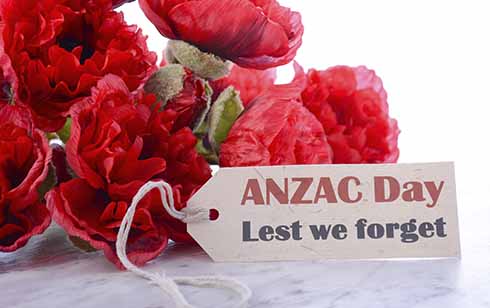 In recent years the public celebration of Anzac Day has been a little overblown. There has been a tendency to see in Anzac Day a symbol of the power of Australia, and a demonstration of its virtues and military prowess. It is has invested in contemporary Australians and their leaders unearned qualities built on make-believe.
In recent years the public celebration of Anzac Day has been a little overblown. There has been a tendency to see in Anzac Day a symbol of the power of Australia, and a demonstration of its virtues and military prowess. It is has invested in contemporary Australians and their leaders unearned qualities built on make-believe.
That emphasis on Anzac Day as a celebration of an imagined heroic Australian identity obscures the death and loss both of soldiers and of their relatives and friends, the cost to families and to Australian society of their loss, and of the responsibility of their dependents to turn from war.
Contemporary experience
This year Anzac Day will not be seen against a canvas screen showing idealised figures in warlike poses or sportsmen looking mean, but against harsh contemporary experience of fires and the coronavirus.
We have seen the reality of bushfire with its devastation of forests and impoverishment of local people in the areas that it touched. We have also seen the ash and smelled the smoke that drove away the comfortable illusion that climate change was unreal, and if real, that it was harmless. We have seen our leaders aimless in the face of fire and, like the rest of us, struggling to comprehend the coronavirus pandemic, and the vulnerability of an economy built on debt. We have seen also the courage and generosity of many Australians, the self-seeking of others, and the cost that fire and sickness have brought to many individuals and the strain they have placed on communities.
Remembrance of past and present
When seen against the events of the year, Anzac Day can be a remembrance both of things past and things present. We can remember and stay with the pain, loss and grief of those who died and returned from war wounded in body and spirit. We remember also the pain of those who grieved their deaths and sometimes suffered their return, and whose lives were changed forever by their wounding.
This year, too, the isolation and anxiety in which we celebrate Anzac Day will echo the frequent experience of soldiers in war. It will be a time to remember and stay with the pain, loss and grief of those who have died through bushfire and illness, and the loss of those whose lives have been disturbed by them. As we remember Anzac Day and the trials of this year, too we remember and are grateful for the simple, humble and self-sacrificing lives hidden like pearls in the darkness of each event.
Virtue of modesty
This year the celebration of Anzac Day will necessarily be modest in its exclusion of marches and gatherings. It should also be modest in its rhetoric, forsaking any glorification of the day that would make the acts of generosity and bravery displayed in battle typical of the nation today or of its leaders.
It should focus on the grief of the day and the more domestic virtues displayed in the aftermath of war and the flu that followed it.